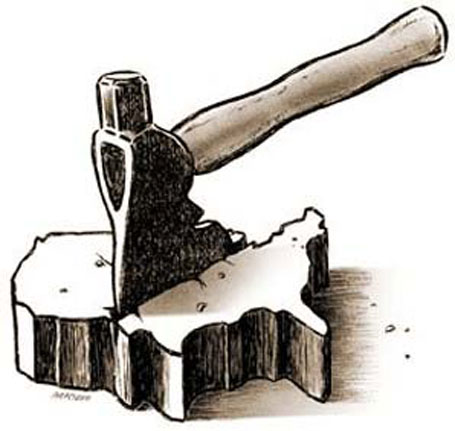
Can a marriage be saved? Maybe not, and maybe not even a friendship. It's all Donald Trump's fault.
Marriages, friendships and business relationships have been thrown at risk in the boiling political culture, where emotion replaces reason and millions of Americans won't have anything to do with someone with a different political opinion.
Inevitably, someone took a poll to prove it. Reuters/Ipso found that 40 percent of its respondents said they had argued with family and friends over the new president, and nearly 20 percent, or 1 in 5, have stopped talking to a friend or someone in the family.
This suggests that a lot of people are living deep in the shallows. Those with real lives understand that politicians, even presidents, come and go like the seasons, and the blistering issues this year will be difficult to recall in detail next year or the year after that. Making a political point, backing down a spouse or significant other in an argument (which actually rarely happens) might be satisfying in the moment, but a warm cuddle is a lot more fun. Faithful old friends are irreplaceable.
No one takes his politics more seriously than a college sophomore, steeped in righteous passion and moral certainty, who sometimes does not stop at mere shouted argument at the Student Union. College boys who were once satisfied to swallow goldfish, stuff a telephone booth with intimate friends or raid the Chi Omega house in search of ladies' panties, have moved on to more serious pursuits.
Students at the University of California at Berkeley, where the destructive '60s were born, shut down the campus the other day to prevent the free intellectual inquiry the campus was invented for, and students at Middlebury College in Vermont even sent a professor to the hospital when she tried to protect a speaker with unpopular views, the eminent scholar Charles Murray, whom the college had invited to the campus. On both occasions the fury was actually aimed at the Donald.
Sophomores usually get over their burden of moral superiority in the fullness of time, but angst, sturm and drang are breaking up wedded unions, too. One unhappy wife, 73, tells The New York Times that she must separate from her husband of 22 years because - horrors! - he voted for President Trump.
The wife, a retired prison guard, was having a quiet lunch with friends when her husband said he planned to vote for the Donald. She said she was "stunned." You might think a prison guard, who had spent many years with robbers, rapists, murderers, burglars, child molesters and maybe even an imprisoned politician or two, would hardly be "stunned" by her husband's choice of president.
When she regained consciousness she said "it totally undid me that he could vote for Trump." It's not clear how a woman of such delicacy could have married a Republican and a conservative in the first place, but discovering the dark side of the evil that she had been under the covers with for decades "opened up areas between us I had not faced before. I realized how far I had gone in my life to accept things I would have never accepted when I was younger."
This account, lifted from the pages of The New York Times, sounds like satire, but it reflects the growing isolation of many Americans, who need not vaccinate themselves against opposing opinions, as if the opinions were the Ebola virus. They will never be exposed to the opinion virus.
David Wasserman of the nonpartisan Cook Political Report examined some of the data now emerging from the November election returns, and finds that 6 in 10 voters cast their ballots in counties that produced landslides for either Mr. Trump or Hillary Clinton. That's up from 50 percent four years ago and from 39 percent in 1992. "This is an accelerating trend," he writes, "that confirms that America's political fabric, geographically, is tearing apart."
Of the election returns from the nation's 3,113 counties, only 303 counties reported winning margins of single digits. The number of "landslide counties," with margins of 50 percent or more, rose from 93 to 1,196. More than a third of the counties are now "landslide counties."
The tragedy in these statistics, and it's nothing less than tragedy, is that a generation of Americans is growing up having never known, or having to talk to, anyone with a different point of view. If it's the fear of "the other" that drives prejudices and bigotries, and early exposure to other views that dissolves them, there is much to fear. "If you think our political climate is toxic now," says David Wasserman, "think for a moment how nasty politics could be 20 or 30 years from now."
Comment by clicking here.
JWR contributor Wesley Pruden is editor emeritus of The Washington Times.


 Contact The Editor
Contact The Editor
 Articles By This Author
Articles By This Author